Carl E. Olson's Blog, page 340
March 19, 2011
Fr. Benedict Groeschel on "The Importance of Knowing St. Joseph"
From his Introduction to The Mystery of Joseph by Marie-Dominique Philippe, O.P.: 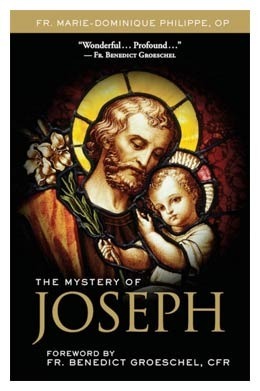
Father Philippe's book on Saint Joseph is very consistent with the new biblical theology called for by Pope Benedict XVI. The author very impressively examines the sparse facts that we have concerning the life of Saint Joseph, teasing from them material that connects easily and well with a very impressive structure of theological teaching. This then becomes a means of providing a firm foundation for devotion to the Foster Father and Guardian of the Son of God.
Except for Christ and Saint Paul, New Testament figures attract little attention from the secular world and especially the secular media – even when they are in a kindly mood. Occasionally a small amount of attention is shown to the figure of the Blessed Mother but rarely is Saint Joseph or any of the Apostles mentioned. Even in cities named Saint Joseph or San José are the inhabitants really conscious of the fact that their hometown is actually named for a person – a person who played a role of immense importance in God's plan of redemption for humankind. This apparent obscurity finds at its root a kind of Protestantism that is focused intensely on the figure Christ and on the writings of Saint Paul, but which seems barely acquainted with Saint Joseph and even the Mother of God, herself.
Catholic theology, which takes a less constricted view of such things, opened up a world of devotion to Saint Joseph the humble carpenter of Nazareth as well as to the Mother of God. How could it be otherwise? These are the figures who stood at the manger on the first Christmas; they are the ones to whom the care of the Word Incarnate was entrusted by God.
March 18, 2011
Abp. Gomez praises, recommends "Jesus of Nazareth: Holy Week"
From Archbishop José H. Gomez's column in today's edition of The Tidings:
I am starting to read Pope Benedict XVI's new book, "Jesus of Nazareth: Holy Week: From the Entrance into Jerusalem to the Resurrection" (Ignatius Press, $25). 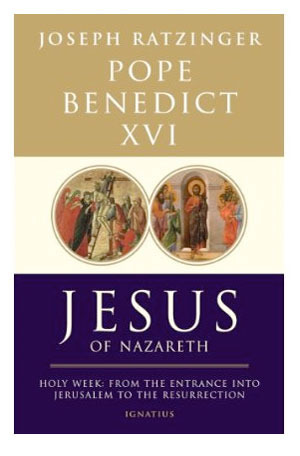
This is the second volume of our Holy Father's proposed trilogy on the life and message of Jesus. It is a scholarly work that is beautifully written, deeply spiritual, and inspires meditation and prayer.
I recommend it highly, especially to theologians, Bible scholars, religious educators, pastors and seminarians. Along with the pope's 2010 exhortation Verbum Domini ("The Word of the Lord"), the two volumes of "Jesus of Nazareth" are essential for all of us. These works help us appreciate how important the Scriptures are for our work of the new evangelization.
The pope's method for reading the Scriptures is as important as the insights he draws from them.
His interpretations reflect what the best scholars have discovered about where the texts came from, their historical background, and the literary styles the biblical authors use.
But he does more than study the texts' historical and literary meaning.
He reads in light of the Church's teachings and tradition. He employs the spiritual interpretation methods found in the New Testament, the writings of the Church Fathers, and in the Church's liturgy.
The pope's method has rich possibilities for those of us who must prepare homilies or study theology.
"Jesus of Nazareth: Holy Week" Enters Top Ten of The New York Times Best-Sellers List

Jesus of Nazareth: Holy Week Enters Top Ten of The New York Times Best-Sellers List | March 18, 2011
Pope Benedict XVI's new book, Jesus of Nazareth: From the Baptism in the Jordan to the Transfiguration, released worldwide on March 10th, has broken the Top Ten on The New York Times best-sellers list. The book, which has received very positive reviews from Catholic, Protestant, and Jewish leaders and scholars, will be #10 on the March 27th nonfiction best-sellers list.
1.2 million copies of the book have been published in eight languages, including German, Italian, English, Spanish, French, Portuguese and Polish.  Jesuit Father Joseph Fessio, founder and editor of the publishing house, says that 300,000 copies were published in Italy, 200,000 in Germany, and 120,000 in France. The book has been published in English by Ignatius Press, The Catholic Truth Society (United Kingdom/Ireland), Paulines Publication (Africa), Freedom Publishing (Australia), and Asia Trading Corporation (Asia). Ignatius Press has now printed 140,000 copies of the book and sold or distributed some 90,000 copies in a week.
Jesuit Father Joseph Fessio, founder and editor of the publishing house, says that 300,000 copies were published in Italy, 200,000 in Germany, and 120,000 in France. The book has been published in English by Ignatius Press, The Catholic Truth Society (United Kingdom/Ireland), Paulines Publication (Africa), Freedom Publishing (Australia), and Asia Trading Corporation (Asia). Ignatius Press has now printed 140,000 copies of the book and sold or distributed some 90,000 copies in a week.
Jesus of Nazareth: From the Baptism in the Jordan to the Transfiguration was the first book written by Pope Benedict XVI after his election in April 2005. It focuses on Jesus' Baptism, temptation, and teachings, especially the Sermon on the Mount, the Lord's Prayer, the parables, and Jesus' declarations about his identity. The second volume, as its title indicates, examines and reflects upon the final days of Jesus' earthly life: his arrival in Jerusalem, his cleansing of the Temple, his eschatological discourse, the washing of the disciples' feet, the Last Supper, his prayer and arrest in the Garden of Gethsemane, his trial, the crucifixion and burial, and the Resurrection. The book's epilogue considers the nature and meaning of Jesus' Ascension into heaven.
Along the way, Benedict ponders deeply the meaning of Jesus' life and death, and responds to a number of challenging questions. These include:
• Who was responsible for killing Jesus?
• Was Jesus a political revolutionary?
• Was he really the Messiah, the Son of God?
• What did Jesus teach about the end of the world?
• Did Jesus establish a community of disciples—the Church—to continue his work?
• How did Jesus interpret his death?
• What does the evidence tell us about Jesus' ultimate fate? Did he really rise from the dead?
• Did the early Christians believe Jesus would return immediately?
"It's clear that what interests the Holy Father is helping people to know and love someone whom he knows and loves," says Father Fessio. "But he does this as a scholar. This book is a bright star in the constellation of books about Jesus." And many scholars have responded with praise for the book, noting its unique combination of complexity, clarity, breadth of learning, and depth of theological insight.
Noted Evangelical Scripture scholar Dr. Craig Evans, professor of New Testament at Acadia Divinity College of Acadia University, Nova Scotia, and editor of The Encyclopedia of the Historical Jesus, calls it "a remarkable achievement", adding, "It's the best book I've read on Jesus in years." He says, "I was impressed by the exegetical insight, the historical critical insight, and yet at the same time the attempt to always keep in line the big picture, what Christian faith is all about, the history of the church and how some of Jesus' teachings and things that He did, and things that happened to Him contributed to major Christian teachings and some of the great creeds."
Another Evangelical scholar, Dr. Ben Witherington III, author of several works on Jesus and the New Testament, expressed admiration for the "knowledge and vital piety in this book". Jesus of Nazareth: Holy Week is "a book I would very happily assign to my students to read as a book about both the Jesus history and the Christ of faith", he said, "I was impressed with his scholarly acumen..."
Dr. Jacob Neusner, prolific Jewish scholar and author of countless books on Jewish history and belief, A Rabbi Talks with Jesus, notes that Benedict has "accomplished something that no one else has achieved in the modern study of Scripture", which is to provide an answer to the question, "How are we to transcend the outcome of critical history with its paralyzing obstacles, theological affirmation?"
Dr. Brant Pitre, who teaches at Notre Dame Seminary in New Orleans, agrees, saying that Benedict, in the book, "really is combining history, historical reason as he puts it, and hermeneutical faith in approaching the gospel from the light of the canon of Scripture, especially Old Testament background..." The Pope's book, Pitre believes, is a successful implementation of "the renewal of biblical studies that the Second Vatican council called for more than forty years ago, but which in his opinion has not yet taken root."
Another Catholic Scripture scholar, Dr. Mary Healy, who teaches at Sacred Heart Major Seminary in Detroit, states, "It seems to me that Benedict's deepest goal is to provide a model of what biblical theology can look like when the tools of modern scholarship are integrated with faith in Scripture as a living word from God. The pope is seeking to reunite what has long been split apart—Scripture and theology, biblical exegesis and Christian faith."
Mark Brumley, President of Ignatius Press, believes that Jesus of Nazareth: Holy Week will be instrumental in further shaping an authentic, vibrant ecumenism rooted in a love for Christ and Scripture. "As a former Evangelical," he remarks, "I can say that I would have been deeply moved as a Protestant to read a book like this from the Pope. And as a Catholic, I can say I'm thrilled so many Protestants are being moved by it. Pope Benedict reveals the Christ-centeredness of the Catholic Church, a reality that is sometimes missed by Protestants and even a few Catholics!"
Although the book reflects the Pope's scholarly background and skills, it is ultimately intended to bring readers into "a personal encounter with Jesus", as Benedict states in the Foreword. His approach, he adds, comes from his attempt "to develop a way of observing and listening to the Jesus of the Gospels that can indeed lead to personal encounter and that, through collective listening with Jesus' disciples across the ages, can indeed attain sure knowledge of the real historical figure of Jesus."
A study guide for Jesus of Nazareth: Holy Week will be available from Ignatius Press on March 30th. The foreword is written by Tim Gray, Ph.D., the chapter summarizes and outlines are by Mark Brumley and Curtis Mitch, and study questions are by Brumley and Laura Dittus. It also includes a list of key terms, a glossary, and a section for readers to write down their personal reflections as they read the book.
Visit the website, www.JesusofNazareth2.com , for excerpts, biographical information, reviews, ordering information, and much more about Jesus of Nazareth: From the Baptism in the Jordan to the Transfiguration.

• "The Mystery of the Betrayer" (from Chapter 3)
• "The Dating of the Last Supper" (from Chapter 5)
• "Jesus Before Pilate" (from Chapter 7)
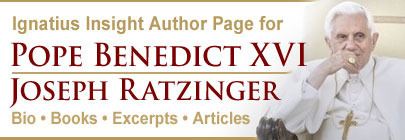
• Biography of Joseph Ratzinger/Pope Benedict XVI
• Jesus of Nazareth (Part 2) available March 10, 2011
• Other Recent Books by Pope Benedict XVI
• All books by or about Joseph Ratzinger/Pope Benedict XVI
• Excerpts from books by Joseph Ratzinger/Pope Benedict XVI
• Articles about Joseph Ratzinger/Pope Benedict XVI
Moral relativism challenged by acclaimed natural law scholar
Press Release about J. Budziszewski's book, What We Can't Not Know:
SAN FRANCISCO, March 17, 2011 – In a new and revised edition of his groundbreaking work, 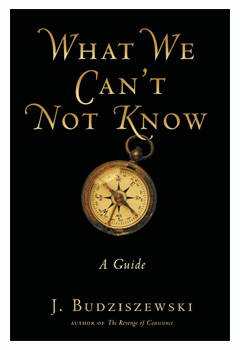 What We Can't Not Know , Professor J. Budziszewski challenges the modern assumption that moral truth is obscure or even unattainable. With clear, logical arguments he rehabilitates the natural law tradition, restoring confidence in a moral code based upon human nature.
What We Can't Not Know , Professor J. Budziszewski challenges the modern assumption that moral truth is obscure or even unattainable. With clear, logical arguments he rehabilitates the natural law tradition, restoring confidence in a moral code based upon human nature.
What We Can't Not Know explains the rational foundation of precepts that are not only right for all, but at some level known to all. Budziszewski show how that foundation has been kicked out from under Western society, so that we deceive ourselves about what we actually know. Having passed through atheism and nihilism in his own search for truth, Budziszewski understands the philosophical and personal roots of moral relativism. With wisdom born of both experience and rigorous intellectual inquiry, he offers a firm foothold to those who are attempting either to understand or to defend the reasonableness of traditional morality.
Budziszewski explains, "St. Paul said the most basic principles of right and wrong are 'written on the heart.' One might think that because they are written on the heart, we can never be confused about them. Or one might think that because we can be confused about them, they aren't really written on the heart. One of my reasons for writing this book was to explain how they really are written on the heart -- and we really can be confused."
Budziszewski believes that natural law theory has entered a new phase, in which theology will again have pride of place. Many thinkers have held that religious conviction hampers the search for common ground. Budziszewski demonstrates that on the contrary, faith can be a pathway to apprehending universal norms of behavior.
Chuck Colson of Prison Fellowship Ministries, says, "What We Can't Not Know is a must-read for those concerned about the state of American culture."
"If you want to understand the law of nature and how we know it, this is the one book to read. I wish every college student could take a course in this subject from this teacher," says Phillip E. Johnson, Professor of Law Emeritus at the University of California at Berkley.
Robert P. George, Professor of Jurisprudence at Princeton University, says, "In What We Can't Not Know, J. Budziszewski shows that even the most sophisticated skeptics unwittingly reveal their moral knowledge in attempts to justify killing, lying, stealing, committing adultery, and other sins. In the very process of attacking Judaeo-Christian moral principles, they confirm them."
J. Budziszewski is a professor of government and philosophy at the University of Texas at Austin. Among his several books are The Revenge of Conscience: Politics and the Fall of Man and The Line Through the Heart: Natural Law as Fact, Theory, and Sign of Contradiction.
To request a review copy or an interview with author J. Budziszewski, please contact: Rose Trabbic, Publicist, Ignatius Press, (239)867-4180 or rose@ignatius.com
Related on Ignatius Insight:
• Natural Law and Bearing False Witness | J. Budziszewski | From What We Can't Not Know: A Guide
• The Scandal of Natural Law | Interview with J. Budziszewski
• Objections, Obstacles, Acceptance | Interview with J. Budziszewski
March 17, 2011
Abp. Timothy Dolan on the priest sex abuse scandal: "This needs to haunt us."
From CBS News:
Calling the Catholic Church sex abuse scandal "hideous" and "nauseating," New York's Archbishop Timothy M. Dolan says the scandal "needs to haunt" the church for some time to come.
In the wide-ranging interview, Dolan also discusses his past role as the archbishop of Milwaukee, his current mission and the state of the church in America with "60 Minutes" correspondent Morley Safer. The profile of the leader of New York City's two-million-plus Roman Catholics will be broadcast Sunday, March 20 at 7 p.m. ET/PT.
Asked if he feared the impact of the scandal would go on forever, Dolan replies, "In some ways, I don't want it to be over, because...this was such a crisis in the Catholic Church that in a way, we don't want to get over it too easily," he tells Safer. "This needs to haunt us."
Politically-Incorrect Democracy and Marriage
"It is a curious irony," notes Oakland, California Bishop Salvatore Cordileone, "that in this moment of history,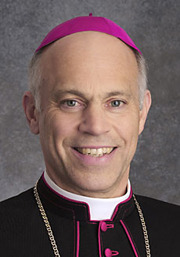 when people in a number of countries in the Middle East are agitating for change from dictatorship to democracy, here in our own country, the oldest democracy with a written constitution in the world, there is a movement of the ruling class toward taking more and more power into its own hands. The flashpoint for this movement? The hot-button issue of our day: marriage."
when people in a number of countries in the Middle East are agitating for change from dictatorship to democracy, here in our own country, the oldest democracy with a written constitution in the world, there is a movement of the ruling class toward taking more and more power into its own hands. The flashpoint for this movement? The hot-button issue of our day: marriage."
Writing in the Oakland diocesan paper, The Catholic Voice, Bishop Cordileone continues: "The comparison of the Middle East and the United States, though, is just irony No. 1 among many others in the ongoing saga of the inter-relation between the marriage issue and democracy. The examples are legion, and it w
ould not be possible to list all of them here. I will, though, mention some of the more salient ones."
"In an explicit denial of his public duty, the then attorney general of the state of California (now governor) refused to defend the law of the state in the Perry v. Schwarzenegger case concerning the constitutionality of Proposition 8. His reason? He is personally opposed to it."
The rest of Bishop Cordileone's column is here.
"But you can't express Christology on Twitter."
From an RNS piece, "From professorial pope, a lengthy paper trail", by Francis X. Rocca:
VATICAN CITY (RNS) Any book with an initial printing of 1.2 million copies in eight languages qualifies as a global publishing event, regardless of its author. But the release last week (March 10) of Pope Benedict XVI's latest tome was especially remarkable.
More to the point, "Jesus of Nazareth—Holy Week," is the latest work of Joseph Ratzinger. For it is the pope's original name that appears atop the cover and title page of this book, the second in a projected trilogy on the life and teachings of Jesus.
The name is there to make clear that the work is not an official decree from the leader of the Roman Catholic Church, but an expression of one scholar's ideas.
That distinction is one that makes Benedict's reign unique. ...
In a book-length interview with a German journalist last year, Benedict made a subtle statement about the morality of condom use that would have been unremarkable from a professor at a seminar table, but which coming from the pope provoked widespread confusion over possible changes to Catholic teaching on the subject.
Fessio, who studied under Ratzinger at the University of Regensburg in the 1970s, says that such misunderstandings are an inevitable but justified side effect of his former teacher's determination to engage in "serious reflection."
"If people don't have ears to hear, that's a problem," Fessio said. "But you can't express Christology on Twitter."
Read the entire article. Visit www.JesusofNazareth2.com for more information about Jesus of Nazareth: Holy Week.
The True Impoverishment of Man: On Benedict XVI and Bishops

The True Impoverishment of Man: On Benedict XVI and Bishops | Fr. James V. Schall, S.J. | March 17, 2011 | Ignatius Insight
"This is the labor for the harvest in the field of God, in the field of human history: to bring to men and women the light of truth, to set them free from the lack of truth, which is the true sorrow, the true impoverishment of man."
— Pope Benedict XVI, "In God's Field", February 5, 2011 (Episcopal Ordination Mass in St. Peter's)
I.
On the occasion of five curial officials being raised to the arch-episcopacy, Pope Benedict XVI's sermon was about the need of truth and the centrality of making it known through the Church. He spoke of the Lord sending laborers into the harvest and, drawing from Isaiah, of the Lord's anointing to bring good tidings to the afflicted and to sooth the brokenhearted. The Pope reminded the bishops to stand as living witnesses, as it says in the first letter of John, to those who saw and touched the Lord. From the beginning, the Church has seen itself as sent to all the nations, however difficult it often is to be received in many of them. The office of Peter exists to assure the unity of witness to what is handed down.
The field of God is spread throughout human history to all the nations. We need to be set free from "a lack of truth." This lack is rightly called a "sorrow" and an "impoverishment." Contrasted to this sorrow are the "glad tidings," which, as the Pope carefully says, are not just words but include "an event." What is this event? Here Benedict echoes the core of his book, Jesus of Nazareth: Holy Week. The unique event is this: "God himself has come among us." This coming is the central truth that the followers of Christ are called upon to make known among the nations.
The Pope is aware of those who reject this truth. "Large parts of the modern world, large numbers of our contemporaries, turn their backs on God and consider faith something of the past." But when we look at what they implicitly want to put in the place of faith, we still find that "a yearning that justice, love and peace will be established at last, that poverty and suffering will be surmounted and that human beings will find joy." So the rejection of faith does not necessarily mean that what the faith promises is rejected or that the fulfillment of this yearning is simply some this-worldly political kingdom.
"The longing for all these things is present in the contemporary world, the longing for what is great and what is good. It is yearning for the Redeemer, for God himself, even when he is denied." Such is the great paradox. Even the denial of God is associated with a divinely established longing in our souls. The modern world is filled with all sorts of schemes to achieve these things. But it is careful not to consider or admit the truth of the Christian understanding of our longing. It is precisely a yearning for "a Redeemer," as the Pope puts it, not just for a sort of perfect order that exists somewhere down the eons in the future beyond any of us.
Read the entire essay on Ignatius Insight...
Sample pages from YOUCAT (Youth Catechism of the Catholic Church)
YOUCAT (Youth Catechism of the Catholic Church), will be available from Ignatius Press in April. You can download a PDF document (2.7 megs) with twelve sample pages; here is a small snapshot of pages 260-61:

More about YOUCAT:
YOUCAT is short for Youth Catechism of the Catholic Church, which will be launched on World Youth Day. Developed with the help of young Catholics and written for high-school age people and young adults, YOUCAT is an accessible, 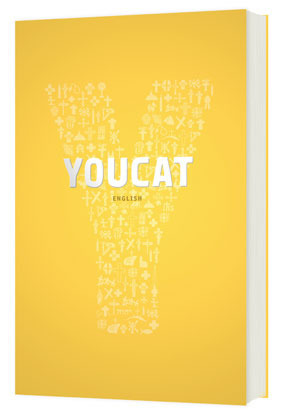 contemporary expression of the Catholic Faith. The appealing graphic format includes Questions-and-Answers, highly-readable commentary, summary definitions of key terms, Bible citations and inspiring and thought-provoking quotes from Saints and others in the margins. What's more, YOUCAT is keyed to the Catechism of the Catholic Church, so people can go deeper. It explains:
contemporary expression of the Catholic Faith. The appealing graphic format includes Questions-and-Answers, highly-readable commentary, summary definitions of key terms, Bible citations and inspiring and thought-provoking quotes from Saints and others in the margins. What's more, YOUCAT is keyed to the Catechism of the Catholic Church, so people can go deeper. It explains:
What Catholics believe and why (doctrine)
How Catholics celebrate the mysteries of the faith (sacraments)
How Catholics are to live (moral life)
How they should pray (prayer and spirituality)
The questions are direct and honest, even at times tough; the answers straightforward, relevant, and compelling. YOUCAT will likely become the "go-to" place for young people to learn the truth about the Catholic faith. Illustrated
What Pope Benedict XVI has to say about the YOUCAT project: Excerpts from the Foreword:
"Dear young friends!
Today I recommend for your reading an unusual book....Should we not attempt to translate the Catechism of the Catholic Church into the language of young people? Should we not bring its great riches into the world of today's youth? Of course, there are many differences even among the youth of today's world. And so now, under the capable direction of the Archbishop of Vienna, Christoph Cardinal Schönborn, YOUCAT has been produced for young people. I hope that many young people will let themselves be fascinated by this book.
Many people say to me: The youth of today are not interested in this. I disagree, and I am certain that I am right. The youth of today are not as superficial as some think. They want to know what life is all about....This book is exciting because it speaks of our own destiny and so deeply engages every one of use.
So I invite you: Study this Catechism! That is my heartfelt desire. This catechism was not written to please you. It will not make life easy for you, because it demands of you a new life. It places before you the Gospel message as the "pearl of great value" (Mt 13:45) for which you must give everything. So I beg you: Study this Catechism with passion and perseverance. Make a sacrifice of you time for it! Study it in the quiet of your room; read it with a friend; form study groups and networks; share with each other on the Internet. By all means continue to talk with each other about your faith...."
Dr. Peters remarks on Coon's contrition, NCReporter's omission
The opening of a new post by Dr. Ed Peters:
Norma Jean Coon, excommunication, reconciliation, and the National Catholic Reporter
I read with bemusement the National Catholic Reporter story on the recent reconciliation of Norma Jean Coon, the San Diego woman who was 'ordained' a deacon but has since repented of her actions. My reactions to the Coon case and NCRep's story on it fall into three parts.
Fair Warning: You're gonna think I'm making the first part up.
1. About a week and a half ago I was contacted by a writer for the NCRep and asked to respond to several questions on the Norma Jean Coon case. There followed the usual journalist "I'm on a tight deadline" plaint.
Now, the Coon case is obviously important, so I took time from a very busy schedule and prepared responses which I sent in promptly (within about 4 hours). I also offered to be available for any follow-up questions. And what happened?
Read the entire post on the "Light of the Law" blog.
Carl E. Olson's Blog
- Carl E. Olson's profile
- 20 followers



